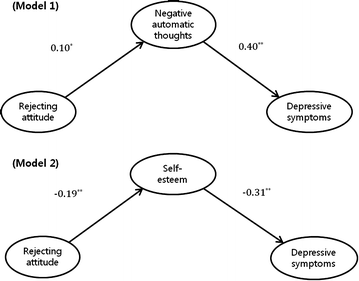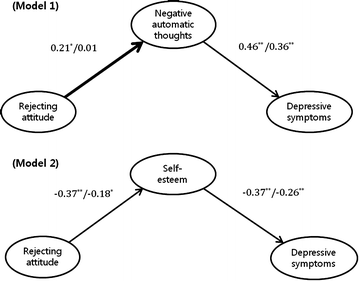The relationship between parenting attitudes, negative cognition, and the depressive symptoms according to gender in Korean adolescents
- PMID: 27123043
- PMCID: PMC4847343
- DOI: 10.1186/s13033-016-0069-3
The relationship between parenting attitudes, negative cognition, and the depressive symptoms according to gender in Korean adolescents
Abstract
Background: Parenting style is one potential contributor to the development of adolescents' cognitions, self-esteem and emotional problems. This study examined the relationship between maternal parenting attitudes and adolescents' negative cognitions, and depressive symptoms according to gender.
Methods: A total of 401 middle and high school students were recruited (i.e. 221 males and 180 females; mean age, 13.92 ± 1.31 years). The Maternal Behavior Research Instrument assessed maternal parenting attitudes. Analyses examined the relationship between parenting attitudes and affective symptoms, with self-esteem and negative automatic thoughts as mediators of these relations.
Results: Maternal rejecting attitudes were positively associated with depressive symptoms via increasing negative autonomic thoughts and decreasing self-esteem among female adolescents. Among male adolescents, maternal rejecting attitudes were associated with low self-esteem, but they were not associated with depressive symptoms.
Conclusions: Maternal parenting has a larger impact on the emotional adjustment of females compared to males. Interventions to increase self-esteem and correct negative cognitions may be helpful for depressed female adolescents, specifically for those whose mothers are rejecting.
Keywords: Adolescents; Depression; Negative cognition; Parenting.
Figures


Similar articles
-
Negative Parenting Styles and Psychological Crisis in Adolescents: Testing a Moderated Mediating Model of School Connectedness and Self-Esteem.Behav Sci (Basel). 2023 Nov 15;13(11):929. doi: 10.3390/bs13110929. Behav Sci (Basel). 2023. PMID: 37998676 Free PMC article.
-
Differences in the relationship between traumatic experiences, self-esteem, negative cognition, and Internet addiction symptoms among North Korean adolescent defectors and South Korean adolescents: A preliminary study.Psychiatry Res. 2017 Nov;257:381-385. doi: 10.1016/j.psychres.2017.07.078. Epub 2017 Jul 31. Psychiatry Res. 2017. PMID: 28818806
-
Parental Phubbing and Adolescents' Depressive Symptoms: Self-Esteem and Perceived Social Support as Moderators.J Youth Adolesc. 2020 Feb;49(2):427-437. doi: 10.1007/s10964-019-01185-x. Epub 2019 Dec 27. J Youth Adolesc. 2020. PMID: 31883099
-
The effects of maternal psychosocial factors on parenting attitudes of low-income, single mothers with young children.Nurs Res. 1998 Jan-Feb;47(1):25-34. doi: 10.1097/00006199-199801000-00006. Nurs Res. 1998. PMID: 9478181
-
[Vulnerability to depression in children and adolescents: update and perspectives].Encephale. 2002 May-Jun;28(3 Pt 1):234-40. Encephale. 2002. PMID: 12091784 Review. French.
Cited by
-
Emotional abuse mediated by negative automatic thoughts impacts functional connectivity during adolescence.Neurobiol Stress. 2024 Mar 19;30:100623. doi: 10.1016/j.ynstr.2024.100623. eCollection 2024 May. Neurobiol Stress. 2024. PMID: 38572483 Free PMC article.
-
Interpersonal Conflict, School Connectedness and Depressive Symptoms in Chinese Adolescents: Moderation Effect of Gender and Grade Level.Int J Environ Res Public Health. 2019 Jun 20;16(12):2182. doi: 10.3390/ijerph16122182. Int J Environ Res Public Health. 2019. PMID: 31226754 Free PMC article.
-
The relationship between harsh parenting and adolescent depression.Sci Rep. 2023 Nov 24;13(1):20647. doi: 10.1038/s41598-023-48138-w. Sci Rep. 2023. PMID: 38001270 Free PMC article.
-
Influential factors of depression: The impact of harsh parenting, school support, and rumination.Heliyon. 2024 Jan 26;10(3):e25014. doi: 10.1016/j.heliyon.2024.e25014. eCollection 2024 Feb 15. Heliyon. 2024. PMID: 38322886 Free PMC article.
-
The Relationship Between Harsh Parenting and Smartphone Addiction Among Adolescents: Serial Mediating Role of Depression and Social Pain.Psychol Res Behav Manag. 2024 Feb 23;17:735-752. doi: 10.2147/PRBM.S438014. eCollection 2024. Psychol Res Behav Manag. 2024. PMID: 38410380 Free PMC article.
References
LinkOut - more resources
Full Text Sources
Other Literature Sources

